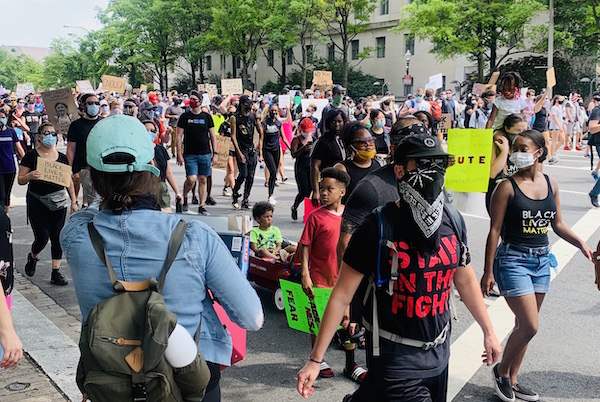Jan 13, 2026 2:09 PM
More Trump-Kennedy Center Cancellations
The fallout from the renaming of the John F. Kennedy Center for the Performing Arts to include President Donald…

Protesters march June 6 in Washington, D.C., following the police killing of George Floyd.
(Photo: John Murph)Closer to home for the jazz community, the newly formed Jazz Coalition partnered with The Blacksmiths (a coalition of artists, curators, producers and organizers), the Intersectional Voices Collective and The Wide Awakes to present “Juneteenth Jubilee,” a June 19 celebration in Harlem to heighten awareness of the Black queer and transgender communities, which also contend with racialized disparities and violence.
While Blackout Tuesday helped to spotlight significant systemic imbalances within the jazz community, it’s difficult to find published studies examining current issues in the music. Works like Zola Philipp’s scholarly paper “The Social Effects of Jazz” and Gerald Horne’s book Jazz and Justice: Racism and the Political Economy of the Music have explored the history of financial exploitation of Black jazz artists. But questions about disparities in wealth and hiring practices, the ownership of jazz labels, jazz media outlets, venues, and nonprofit institutions and access to education have yet to be studied in such depth.
“Historically, who owns a lot of music publishing and whose songs were they? Let’s just start there,” said Katea Stitt, program director at WPFW—Washington, D.C.’s Pacifica Foundation radio station. The daughter of late saxophonist Sonny Stitt, she also said she participated in recent protests in the capital. “Who owned the clubs? And who played inside the clubs?” she asked.
Vocalist and activist Myers recently published a book, White People Talking to White People: Broaching the Topic of Race with your White Friends, as a guide for how individuals can address systemic racism within their own homes and businesses. He, too, cited glaring racial discrimination in jazz performance spaces and the education system.
“If we do not force white people in jazz to start examining their own fragility and privilege that we as Black people have tolerated and tiptoed around for as long as we’ve been in this genre, the systemic racism within jazz will continue,” he said.
“A lot of jazz musicians are afraid to speak up about it, because they’re afraid they are going to lose some of their audience,” Myers continued. “They know their audience is a lot of white people—older white [people] at that. We as jazz musicians can no longer be in a position of playing it safe. In this moment, where do you stand? I push everyone within the jazz community to make a stand and put our own individual equity in jeopardy in the fight against racial injustices, including those within the jazz industry.” DB

Belá Fleck during an interview with Fredrika Whitfield on CNN.
Jan 13, 2026 2:09 PM
The fallout from the renaming of the John F. Kennedy Center for the Performing Arts to include President Donald…

Peplowski first came to prominence in legacy swing bands, including the final iteration of the Benny Goodman Orchestra, before beginning a solo career in the late 1980s.
Feb 3, 2026 12:10 AM
Ken Peplowski, a clarinetist and tenor saxophonist who straddled the worlds of traditional and modern jazz, died Feb. 2…

The success of Oregon’s first album, 1971’s Music Of Another Present Era, allowed Towner to establish a solo career.
Jan 19, 2026 5:02 PM
Ralph Towner, a guitarist and composer who blended multiple genres, including jazz — and throughout them all remained…

Rico’s Anti-Microbial Instrument Swab
Jan 19, 2026 2:48 PM
With this year’s NAMM Show right around the corner, we can look forward to plenty of new and innovative instruments…

Richie Beirach was particularly renowned for his approach to chromatic harmony, which he used to improvise reharmonizations of originals and standards.
Jan 27, 2026 11:19 AM
Richie Beirach, a pianist and composer who channeled a knowledge of modern classical music into his jazz practice,…